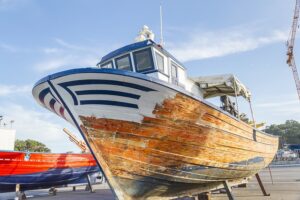
No matter where you boat, corrosion attacks the inside and outside of your outboard.
No matter where you boat, corrosion attacks the inside and outside of your outboard. Some forms you can see, some you can’t, and it only takes a short time for the damage to begin. If you boat in freshwater, you must be aware of corrosion. Even rainwater can have corrosive effects that can damage your outboard. So, it’s vital to be diligent in your anti-corrosion defense.
Here are some tips on mitigating the presence and damage of corrosion.
Galvanic Corrosion
Galvanic corrosion causes the boat’s hull to corrode when connected to shore power. Corrosion occurs when two dissimilar metals are submerged in a conductive solution, such as seawater, and are electrically connected by the shore connection. One metal is protected, while the other is corroded, i.e., your boat’s hull.
This type of corrosion causes an electrical current to run from your boat’s hull to the shoreline, potentially electrocuting someone swimming between your boat and the shore when you are connected to the shore power. You must protect your boat and the people in the water from this risk.
Choose the Proper Materials
Corrosion causes severe damage depending on the material of the ships. Many metals are more affected by corrosion than others, so it’s essential to consider that when replacing and building parts. Stainless steel and plastics are more corrosion-resistant. Certain nickel and titanium alloys are designed for corrosion prevention and are ideal materials to ensure optimum protection and longevity of your vessel.
Install an Isolation Transformer
An isolation transformer eliminates electrical continuity between shore power and your boat. The shore power is fed to the primary side of the transformer, and the ship is connected to the secondary. The isolation transformer isolates the boat from the shore ground. By connecting all metal parts to the neutral output of the transformer, in the case of a short circuit, a circuit breaker will trip, or a fuse will blow.
Or a Galvanic Isolator
A galvanic isolator blocks all low-voltage DC current from flowing in the shore power safety ground wire. It breaks the corrosion current path and isolates your boat, preventing some sources of corrosion while keeping the safety grounding connected. The isolator is installed directly behind your boat’s 230V connection. The forward voltage from the galvanic isolator is higher than the potential difference between metals. As a result, this voltage will not allow conduction so the galvanic isolator will prevent any electrolytic current.
Marine Electric Systems, LLC is a Leader In the Maritime Industry
We here at Marine Electric Systems have over 30 years of industry experience. You can trust our team for reliable service and expert craftsmanship in the Maryland, Baltimore, Annapolis, and Baltimore city areas! We’re highly certified and adhere to all ABYC and NMEA regulations. We specialize in top-notch electrical solutions for recreational, commercial, and government boating clients. Anything from electrical refits, to navigation systems, or boating maintenance. To stay up to date on our services, follow us on Facebook, LinkedIn, Pinterest, Instagram, and YouTube. You can also contact us at 410-263-0807.
